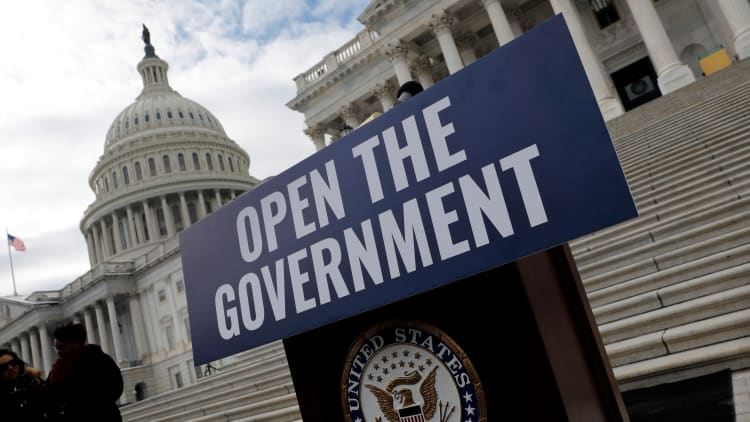
The White House pushed for a "large down payment" on President Donald Trump's proposed border wall Thursday as part of a potential deal to reopen the government for three weeks.
After the Senate rejected two proposals to end the partial shutdown, now in its 34th day, Senate Majority Leader Mitch McConnell and Senate Minority Leader Chuck Schumer met to discuss a possible solution. Numerous senators from both parties pledged support for a continuing resolution to fund the government for three weeks, as real talks started to take shape for the first time since before the shutdown began.
Speaking to reporters Thursday, Trump said he would support a deal the Senate strikes if it is a "reasonable agreement." Earlier, after Trump spoke to his ally Sen. Lindsey Graham, R-S.C., the White House backed the potential agreement — with conditions.
"Leader Mitch McConnell and Senator Chuck Schumer are meeting now to see whether or not they can work out of the deadlock. As was made clear to Senator Lindsay [sic] Graham, the 3 week CR would only work if there is a large down payment on the wall," White House press secretary Sarah Huckabee Sanders said in a statement.
Even as the senators tried to strike a deal, House Speaker Nancy Pelosi voiced opposition to Trump's terms. She told reporters that a deal including wall money "is not a reasonable agreement between senators," according to CNN.
Funding for nine U.S. departments lapsed on Dec. 22 as Trump demanded $5.7 billion to build the wall — and Democrats refused his request. Sanders did not mention a specific amount of funding the president seeks or if he still wants $5.7 billion.
Outside of McConnell's office Thursday, Schumer said, "We're talking," but no more to reporters. Even the dialogue marks an improvement in talks: Negotiations essentially came to a halt after Trump walked out of a meeting with Schumer and Pelosi on Jan. 9.
Trump noted that he has "other alternatives" he can use to construct the border wall. He has previously threatened to declare a national emergency if he cannot get Congress to approve funding for the project. The White House is reportedly preparing a draft emergency declaration, according to CNN.
Sanders' statement followed the failure of two plans in the Senate — one backed by Republicans, and one put forward by Democrats. The Democratic measure, which did not include funds for the barrier, earned more support, including votes from six Republicans, in the GOP-held chamber.

Trump's offer included $5.7 billion for the wall, as well as three-year extensions of legal protections for immigrants brought to the U.S. illegally as children and people fleeing crises in certain countries. Democrats called the proposal inadequate, as previous offers related to "Dreamer" immigrants included either permanent residency or path to citizenship.
A potential solution would likely involve some movement on those issues.
The financial pain felt by 800,000 federal employees is about to sharpen. On Friday, those workers will start losing their second paychecks since the partial closure started on Dec. 22.
Thousands of government employees have scrambled to pay for meals and cover their bills. The shutdown has affected various services, from airports to FBI investigations and food safety inspections. As hundreds of thousands of workers face furloughs or work without pay, the shutdown is expected to reduce gross domestic product growth.
Surveys indicate most Americans see the closure as a "crisis" or at least a "problem." They largely put the shutdown on Trump's shoulders. As Americans seek an end to the impasse, more of them believe the president should yield than think congressional Democrats should, according to a CBS News poll.
This story is developing. Please check back for updates.


